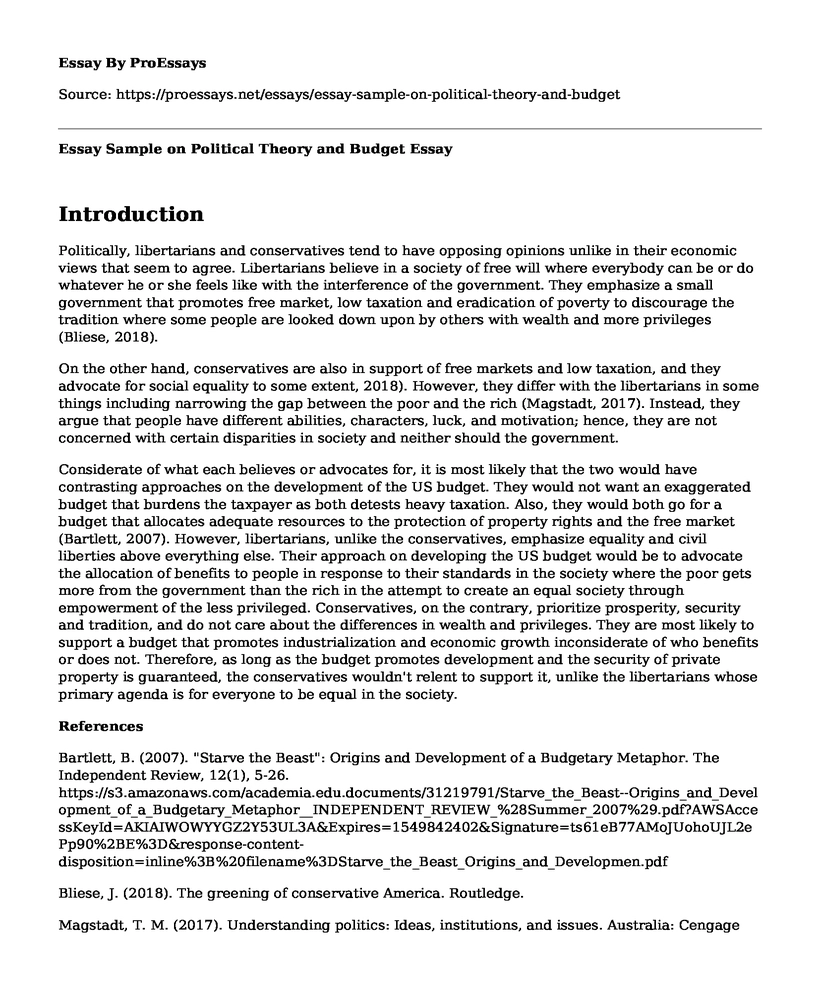Introduction
Politically, libertarians and conservatives tend to have opposing opinions unlike in their economic views that seem to agree. Libertarians believe in a society of free will where everybody can be or do whatever he or she feels like with the interference of the government. They emphasize a small government that promotes free market, low taxation and eradication of poverty to discourage the tradition where some people are looked down upon by others with wealth and more privileges (Bliese, 2018).
On the other hand, conservatives are also in support of free markets and low taxation, and they advocate for social equality to some extent, 2018). However, they differ with the libertarians in some things including narrowing the gap between the poor and the rich (Magstadt, 2017). Instead, they argue that people have different abilities, characters, luck, and motivation; hence, they are not concerned with certain disparities in society and neither should the government.
Considerate of what each believes or advocates for, it is most likely that the two would have contrasting approaches on the development of the US budget. They would not want an exaggerated budget that burdens the taxpayer as both detests heavy taxation. Also, they would both go for a budget that allocates adequate resources to the protection of property rights and the free market (Bartlett, 2007). However, libertarians, unlike the conservatives, emphasize equality and civil liberties above everything else. Their approach on developing the US budget would be to advocate the allocation of benefits to people in response to their standards in the society where the poor gets more from the government than the rich in the attempt to create an equal society through empowerment of the less privileged. Conservatives, on the contrary, prioritize prosperity, security and tradition, and do not care about the differences in wealth and privileges. They are most likely to support a budget that promotes industrialization and economic growth inconsiderate of who benefits or does not. Therefore, as long as the budget promotes development and the security of private property is guaranteed, the conservatives wouldn't relent to support it, unlike the libertarians whose primary agenda is for everyone to be equal in the society.
References
Bartlett, B. (2007). "Starve the Beast": Origins and Development of a Budgetary Metaphor. The Independent Review, 12(1), 5-26. https://s3.amazonaws.com/academia.edu.documents/31219791/Starve_the_Beast--Origins_and_Development_of_a_Budgetary_Metaphor__INDEPENDENT_REVIEW_%28Summer_2007%29.pdf?AWSAccessKeyId=AKIAIWOWYYGZ2Y53UL3A&Expires=1549842402&Signature=ts61eB77AMoJUohoUJL2ePp90%2BE%3D&response-content-disposition=inline%3B%20filename%3DStarve_the_Beast_Origins_and_Developmen.pdf
Bliese, J. (2018). The greening of conservative America. Routledge.
Magstadt, T. M. (2017). Understanding politics: Ideas, institutions, and issues. Australia: Cengage Learning. Chapters 2, 3 (pgs 56-59), 13
Cite this page
Essay Sample on Political Theory and Budget. (2022, Nov 25). Retrieved from https://proessays.net/essays/essay-sample-on-political-theory-and-budget
If you are the original author of this essay and no longer wish to have it published on the ProEssays website, please click below to request its removal:
- Essay Sample on Problems of the Present Day Democratic Nation State
- Government Ethics and Compliance Essay Example
- Risk Assessment Stage - Essay Sample
- Essay Example on Thomas Jefferson's 1800 Presidential Campaign
- Essay on Honoring the Efforts of All Involved for Accessible Toronto Libraries
- Paper Example on AWC's Debt: Uncovering the Core Causes
- US Diplomacy: Leveraging Friendship & Mutual Understanding - Essay Sample







